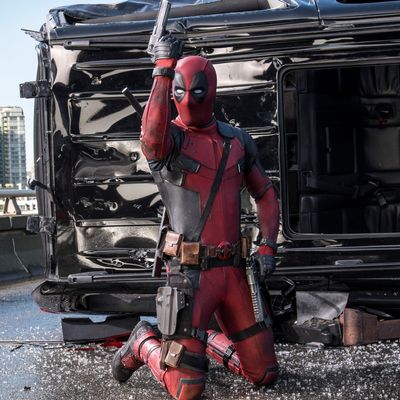
The Marvel Universe — made up of multiple galaxies, among them Disney’s Marvel Cinematic Universe (including the Avengers, et al, and the Netflix heroes) and Fox’s Marvel properties (the X-Men family of characters, the Fantastic Four) — represents the most powerful entertainment entity in history, apart from maybe the Roman Empire’s gladiator franchise. But every time pretentious critics like moi gear up to rail against the way it has gobbled up Hollywood’s resources, along comes a disarming new variant on the standard superhero: say, Marvel’s Jessica Jones, the grown-up, female-centric Netflix emo-noir with Krysten Ritter; or, now, Deadpool, the agreeable, unprecedentedly R-rated romp with in-jokes, dirty words, and splatter.
Directed by first-timer Tim Miller, Deadpool is a send-up of Marvel movies but in no way a takedown of them. It’s not subversive — it’s meant to elasticize and enhance the superhero genre, to flatter the audience for being hip enough to get all of those in-jokes. And I was flattered. A line that hinges on actors in another Marvel series had me cracking up for an entire minute, wagging my head and smiling and cracking up again. The screenwriters, Rhett Reese and Paul Wernick, had anticipated my own response and beat me to it by maybe a tenth of a second. They know what we know.
The title character — born Wade Winston Wilson — appeared as a villain in the early ’90s before evolving into a rude, fast-talking antihero. I hadn’t been familiar with him before this, but superhero-comic non-readers have come to realize that Marvel has a hell of a lot of characters, and I imagine we’ll get to know every last one of them in the coming decade. In Deadpool, he’s played by Ryan Reynolds, whom fanboys will recognize (likely with horror) as the star of the dim film adaptation of DC’s Green Lantern. Those screenwriters are way ahead of them, delivering Lantern barbs from the get-go. They also make fun of Reynolds’s acting. They even have Wade question his own stature, turning to the camera — he’s known for breaking the fourth wall — to ask why he deserves his own movie.
The structure is gratifyingly twisty. In the course of the first bloody battle (heavy on wisecracks and brain matter), the action pauses for flashbacks to Deadpool’s “origin story.” We learn that he’s ex-military; that he did nasty things for money, though only against nastier people; and that he fell in love with a smoking-hot prostitute named Vanessa (Morena Baccarin), with whom he canoodles in a month-by-month montage set to Neil Sedaka’s “Calendar Girl.” Baccarin, who has appeared in several superhero vehicles and was Brody’s often-topless wife in the early seasons of Homeland, disrobes a lot, but Wade assures us that she’s not just another sex object peddled by Hollywood. We laugh knowingly.
A surge of calamities, the last at the hand of the British bad guy, Ajax (Ed Skrein), leaves Wade so mutilated that a stretchy blue Spider-Man-like costume is the best way to appear in public. But Ajax — a mutant in the X-Men mode — is also responsible for bringing Wade’s own dormant mutant powers to the surface. After several face-offs with Ajax as well as a vigorous disagreement with a pair of lesser-known X-Men — a computer-generated, Russian-accented steel colossus called, aptly, Colossus (voiced by Stefan Kapicic) and a punk girl called Negasonic Teenage Warhead (Brianna Hildebrand) — Wade must rescue Vanessa and force Ajax to give him his old face back.
In some ways, Deadpool resembles the old Hope and Crosby Road pictures, with one obvious exception: The action is relatively serious. Actually, more than serious: It’s lavishly, gratuitously gory, with a gleeful kick; and, at one point, the hero is tortured so cruelly for so long I had to look away. In his typical eyes-on-us way, Wade says something along the lines of, “This is where it becomes a horror movie” — which makes Deadpool a have-your-torture-porn-and-make-fun-of-it-too film.
The movie has no theme, no subtext, and no villains of stature, although it’s always nice to see Gina Carano (as Ajax’s vicious sidekick, Angel Dust) throw people across the screen. What saves it are the jokes. I estimate that 50 percent of them hit home, another 30 whiz by inoffensively, and only 20 percent are genuine stinkers — a hell of a good percentage given the sheer number of one-liners. And Reynolds knows how to skip along the surface of the role but, when he needs to, bring out the big dramatic guns. He’s an underrated actor — although with luck not after this film.
I feel a bit like a shill for recommending Deadpool. One reason it snared me was that its hero is, when you come down to it, a snotty film critic — albeit with less flab than the real thing. The movie is reminiscent of the web series Honest Trailers, which uses a film’s own selling points to lampoon it. It’s so on the wavelength of the current mainstream audience that you might find yourself thinking, This is Marvel’s universe, and we’re just renting space in it.


